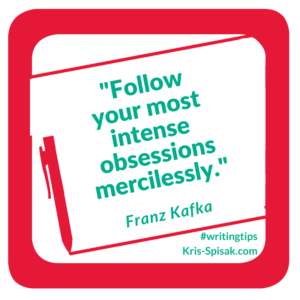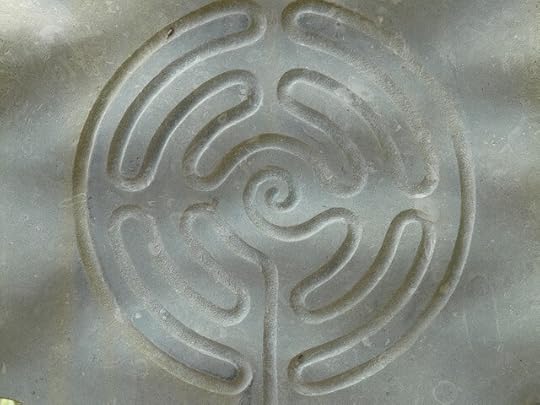Kris Spisak's Blog, page 10
March 26, 2020
Write It Down – Journal Prompt #2 (video)

We don’t always take the time to pause and appreciate the little things that bring us joy. But right now, in this moment of your life, let’s pause. Collect your thoughts and truly take in the realities of your day. Start by writing today’s date then keep going.
Today’s prompt: What is your favorite thing about your home? A specific room? A specific nook? A specific shady tree? The smell of your kitchen at dinner time? What is something so simple that you’ve never even thought to write down before? Now write it down.
This is the journal prompt #2 in my #WriteItDown Series. Follow along with me as we keep recording our stories in this moment we’ll never forget. (See Prompt #1)
Follow along here on my blog, on YouTube, Facebook, LinkedIn, or Twitter. Everyone has a story to add to this moment. Add your voice.
Join 1,000+ subscribers and sign-up for my monthly writing and editing email newsletter for more tips like this.
The post Write It Down – Journal Prompt #2 (video) appeared first on Kris Spisak.
March 20, 2020
Write It Down – Journal Prompt #1 (video)

Everyone has a story. In this moment of history especially, take a few minutes to capture your day-to-day. Journal it. Start with today’s date. Then record all of the details you can think of. Hopes. Fears. New realities. Your future self will thank you for it.
Whether you have ever considered yourself a “writer” or not, #WriteItDown. And if you need a partner on this journey, I’m here for you. Today, we’re starting with Journal Prompt #1.
Follow along here on my blog, on YouTube, Facebook, LinkedIn, or Twitter. Everyone has a story to add to this moment. Add your voice.
Join 1,000+ subscribers and sign-up for my monthly writing and editing email newsletter for more tips like this.
The post Write It Down – Journal Prompt #1 (video) appeared first on Kris Spisak.
February 20, 2020
Writing Tip 397: “Carrots,” “Karats,” “Carats,” or “Carets”?

 It’s widely understood that carrots can keep your eyesight healthy, but as an editor, I’d argue that carets can help your eyes see better too (or they can at least help you notice things you might not have seen before). As for karats and carats, I suppose a certain amount of bling can make anything sparkle brighter.
It’s widely understood that carrots can keep your eyesight healthy, but as an editor, I’d argue that carets can help your eyes see better too (or they can at least help you notice things you might not have seen before). As for karats and carats, I suppose a certain amount of bling can make anything sparkle brighter.
Right? No? Well… are you at least with me when it comes to the definitions of these four words? “Carrots,” “Karats,” “Carats,” or “Carets.” Only one of them is something that you can grow in your garden.
Remember:
A “carrot” is an elongated root vegetable, which you probably imagine as orange, but rumor has it that this color only became the popular version of carrots after it was cultivated and celebrated in the Netherlands in honor of the Duke of Orange in the 1600s. I’m not convinced this story is actually true, but it’s a lovely rumor all the same. Besides orange, they can also come in white, yellow, and purple. The word “carrot” comes from the Middle French word carotte, the Late Latin word carota, and even further back from the Greek word karōton, which ultimately derives from the Indo-European root ker-, meaning “horn,” a reference to their long shape. Is that a mouthful of words? Yes. But it’s a healthy mouthful.
A “karat” is a measure of the pureness or fineness of gold, and a “carat” is a unit of measure for gemstones, such as diamonds; however, these words can’t be used interchangeably. When you see 18k gold, this is referencing karats; however, referencing the “karats” of a gemstone is largely considered wrong. (No one likes being looked down upon in a jewelry store, so consider this your heads up.) Some will argue that it’s permissible to talk about “carats” of gold, making the mistake in the opposite direction—but why don’t you keep it safe and remember the difference. And speaking of fun etymologies (i.e., fun word backstories): “carat” comes from the name for the seed of a carob tree, because this was the standard weight comparison for small gemstones hundreds of years ago. A one carat diamond weighed the same as a carat (or carab tree seed). The Middle French word, carat, referenced either the purity of gold or the weight of gems (yep, one word for both!), and this came from the earlier Greek word, keration for that carob seed. Long story short, that “k” vs. “c” confusion is understandable.
A “caret” (^) is a favorite mark of editors everywhere, used to show where an insertion needs to be made. Editors and wordsmiths might revel a bit to know that this mark gained its name from a derivation of the Latin word, carēre, meaning “to be lacking.” There’s a certain elegance and weight added to this symbol once you know its etymology, isn’t there? It’s more than an arrow. It has Latin editorial history behind it. How lovely is that? I’m guessing that’s not just my reaction.
A “caron” (ooh, look, bonus word tip!) is a bit like an upside down caret (ˇ). It’s a mark that exists over letters in some Baltic, Slavic and Finno-Lappic languages to indicate a changed pronunciation. It’s also called a haček, wedge, inverted hat, hook, and flying bird, among other names. The “caron” word origin remains a bit of a mystery, but one of the leading theories is that it comes from a combination of “caret” and “macron,” the mark ( ¯ ) that exists over some vowels to stress the sound in some languages.
When it comes to “carrots,” “karats,” “carats,” or “carets,” spellcheck can’t help you. Maybe your eyes do just need an extra little bit of help. There are many things you can reach for in this moment: Red pens. Healthy vegetables. Something shiny. So many options.
Just make sure you know the difference.
Join over 1,000 subscribers and sign-up for my monthly writing and editing email newsletter for more tips like this.
The post Writing Tip 397: “Carrots,” “Karats,” “Carats,” or “Carets”? appeared first on Kris Spisak.
January 30, 2020
Writing Tip 396: “Acknowledgments” or “Acknowledgements”?

 Recognizing and thanking those who have helped you out along the way is always a good thing—whether in your essay research, your book writing journey, or in everyday life—but wait, how do you spell that word? “Acknowledgments” or “Acknowledgements”?
Recognizing and thanking those who have helped you out along the way is always a good thing—whether in your essay research, your book writing journey, or in everyday life—but wait, how do you spell that word? “Acknowledgments” or “Acknowledgements”?
Spellcheck won’t help you. Again. Darn spellcheck.
The answer doesn’t harken back to a complex etymology story. Nope, it’s quite simple:
In standard American English, “acknowledgments” is spelled without the additional “e.” This is largely true in Canada as well.
In British English, and most places outside of North America, “acknowledgements” is spelled with the extra “e.”
Is this tied back to Ben Franklin, Noah Webster, and other early American language revolts? Not this time. In fact, “acknowledgment” and “acknowledgments”—without the extra “e”—were once the preferred forms everywhere. If you’re surprised, I was too. The English language often gains spelling variants that drop extra letters, but rarely are extra letters added.
“Acknowledgment” was first recorded in 1567, but here’s another instance of a word that has waffled quite a bit when it comes to a standard spelling, especially in its early years.
Yes, “acknowledgement” without the “e” was once the clear winner when it comes to published books, but look how close those two lines have come in the past fifty or so years. Something happened that created a rift across the oceans. In the 1960s, British English reclaimed the extra “e,” and it has been the preferred form in England and most of the English-speaking world (minus North America) since that time. We have another linguistic mystery on our hands, one I’m still working to figure out. I’ll let you know what I can dig up.
Meanwhile, I’m curious about the decline of the usage of “acknowledgements” over time. The above graph shows percentages of use, not total use, but it’s still worth examining. Is it that so many more books are published in the present day so that its usage is only a minuscule percentage of the total words published? Are we less appreciative today than we have been in years past? These questions remain to be other mysteries to explore.
But in the meantime, if you’re writing out your “acknowledgements” or “acknowledgments,” let your geography or your audience’s geography decide your answer. At least that part is clear.
Happy writing, folks!
Sign-up for my monthly writing and editing email newsletter for more tips like this.
The post Writing Tip 396: “Acknowledgments” or “Acknowledgements”? appeared first on Kris Spisak.
November 22, 2019
S3: E6 – Why “Soccer” instead of “Football,” Americans? Seriously, why?

 Why do I call this the “Words You Should Know” podcast? It’s not a lecture. The whole idea of grammar police annoys me. This is the podcast that reminds you that Ben Franklin and Kurt Cobain both influenced our modern English language, and that spelling memes deserve to be debunked. See past episodes for those details.
Why do I call this the “Words You Should Know” podcast? It’s not a lecture. The whole idea of grammar police annoys me. This is the podcast that reminds you that Ben Franklin and Kurt Cobain both influenced our modern English language, and that spelling memes deserve to be debunked. See past episodes for those details.
Today, let’s start with Franz Kafka, and if you’re thinking of the author of The Metamorphosis and having flashbacks to a story about a man transformed into a giant cockroach-like bug, your mind is in the right place. One of my favorite quotes from Kafka is, “Follow your most intense obsessions mercilessly.”
What are your most intense obsessions? It’s a good question to ask yourself isn’t it? And are you following them mercilessly?
Season 3, Episode 6: Why “Soccer” instead of “Football,” Americans? Seriously, why?
Approximate transcript:
For some of us, that obsession is writing, storytelling, and changing the world in our own ways with our words. For others, it can be so many things. Maybe your most intense obsession has to do with sports, and you know what, that’s okay too.
And that’s where we’re going with today’s podcast. Do you know what’s been bugging me for an awfully long time? Why do we, in America, call soccer “soccer”? Why isn’t it football, as the sport is called throughout most of the rest of the world? “Football” makes sense. In soccer, you’re using your feet. In American football, there’s minimal kicking involved. Do the kickers and punters get all the attention? Hardly. So what’s up with that?
Here’s what we need to know:
We’ve talked about the differences between American and British English before (here’s looking at you rebellious Ben Franklin and Noah Webster), but this isn’t quite as clear-cut as you might imagine.
Let me ask this, who first used the word “soccer”? Was it someone in England or the United States?
Answer: England.
Yep, it’s true.
The word “football” has meant a few things over the years. In 1863, when England’s Football Association drafted its official rules, there was another type of football in the mix. This was called “Rugby football,” a variety that originated in the Rugby boarding school. But in the world of sports, so many things gain short-hand names. Rugby football was often called “Rugger” in the 1880s, and Association Football was often called “Assoccer” (stemming from that “Association” name). “Assoccer” was sometimes further shortened to “soccer” or “socker,” but it was never a widely accepted term. Just a nickname among players.
By the 1900s, rugby was just “rugby,” and football became simply “football,” for most of the world. But then the Americans were doing their own thing. They took these two old football games, rugby and association football, and merged them to create their own game, which they dubbed “football.” Both rugby football and association football were a part of it, so the name made sense. Absolutely. Logically. Sure. Just not on a global scale.
 So to distinguish new American-dubbed “football” with the “Association football” played across the world, the Americans borrowed this “soccer” term. And the rest is history.
So to distinguish new American-dubbed “football” with the “Association football” played across the world, the Americans borrowed this “soccer” term. And the rest is history.
And now you know. American inventiveness. Borrowed vocabulary. It’s really the story of so many other language explorations we’ve touched on, isn’t it?
“Football,” of course, is hardly the only word that stems from a body part. I can’t help myself. I have to share a bit more on this.
“Foot” linked with “ball” is pretty self-explanatory.
A few others a bit more surprising in this category include “gargoyle,” “hysteria,” “genuine,” and “handsome.”
The word “gargoyle” comes from the Old French word for throat, gargoule, because the stone statues not only looked fierce but also redirected rain water away from the building they perched upon by flowing water through their throat waterspouts.
“Hysteria,” much to the annoyance of modern women everywhere, comes from the Greek word for the womb, hystera, because it was once thought hysteria came from an imbalance in the uterus. #sigh
“Genuine,” meaning the real thing, has a slightly confused origin, but it seems it may come from the Latin word for one’s knee, genu, because a father would be able to assess a child’s true paternity by placing the child on his knee. Um, #yikes?
And then there’s “handsome.” This one is so obvious and yet so not. You might not be thinking about hands when you think of someone being handsome, but that was the original origin of this word that has had it’s meaning transform time and time again over the years. “Handsome” once meant for something to be nearby or at hand. Later, it meant appropriate, then it meant skillful then someone generous. It wasn’t until the 1500s that it meant good-looking.
Should we talk about the genuine hysteria over a team called the gargoyles? Maybe, despite their name, their players are actually quite handsome.
I don’t know about you, but I’m at least feeling good about having all of that soccer-football confusion settled.
What’s next on your list of intense obsessions? The powerful use of language? Yep, I’m with you on that one.
Join 900+ subscribers and sign-up for my English language tips and trivia email newsletter for more articles and podcasts like this.
If you like what you’ve been hearing, don’t forget to subscribe to this podcast (via Apple Podcasts, Android, Google Podcasts, Stitcher, or RSS) so you’ll never miss out on another word you should know. Many thanks to those of you who have taken the time to rate my show on iTunes or wherever you listen.
And if you’re looking for an Elements of Style for the Twitter Generation, check out my book, Get a Grip On Your Grammar: 250 Writing and Editing Reminders for the Curious or Confused. Newbery-winning author Meg Medina says, “You should keep a copy on your desk.” Sounds like good advice to me!
Or if fiction is your passion, stay tuned for more details on my new book, The Novel Editing Workbook: 50 Tricks and Tips for Revising Your Fiction Manuscript.
Words. Language. Communications. You’ve got this.
The post S3: E6 – Why “Soccer” instead of “Football,” Americans? Seriously, why? appeared first on Kris Spisak.
November 7, 2019
Writing Tip 395: “Daylight Savings Time” or “Daylight Saving Time”?

 You know what’s weird? “Daylight Savings Time” is not the correct name for when we shift our clocks an hour back or forward, but it feels like it’s more commonly said than than the correct version, which is “Daylight Saving Time” (DST).
You know what’s weird? “Daylight Savings Time” is not the correct name for when we shift our clocks an hour back or forward, but it feels like it’s more commonly said than than the correct version, which is “Daylight Saving Time” (DST).
Did you catch the difference? It should be “Saving,” not “Savings.”
“Saving” is not acting as a verb, which might make you assume some version of an “s” is needed, or maybe you’re just thinking about your savings in the bank, “savings” in that case being the noun form.
“Daylight saving” together makes an adjective phrase modifying “time.” Should there be a hyphen in “daylight saving,” since it’s working together as an adjective? You could make an argument for it (ignoring new AP hyphen rules), but it’s not the standard form. But why am I talking grammar jargon? Let’s get back to the interesting stuff. I hear you. I really do hear you. Who wants to talk grammar jargon?
Daylight Saving Time was first put into action in a small Canadian town in Ontario in 1908, but the first full countries to adopt the system were Austria and Germany in 1916 during World War I. A number of other European countries followed suit—and the U.S. began its own version, dubbed “Fast Time” in 1918—but after the end of the Great War, most countries stopped the practice. During World War II, Daylight Saving Time had a bit more staying power. In 1942, President Roosevelt reintroduced “War Time,” but rather than seasonal adjustments, the newly shifted time system stuck year round, all the way through 1945, which brought the end of the war and thus the introduction of “Peace Time.”
It wasn’t until the Uniform Time Act of 1966 that “Daylight Saving Time,” roughly as we know it today, went into effect—and that, of course is “Saving” not “Savings.”
This “s” or no “s” debate seems to have first arisen in the 1970s, but it’s been a consistent matter of confusion ever since. Here’s the Google Ngram that tracks the use of the two wordings over time:
Twice a year, we’re reminded to change our clocks, and twice a year, people write all about “daylight savings time.”
But not you any longer, savvy time-changer. No longer you.
Join 900+ subscribers and sign-up for my writing and editing email newsletter for more tips like this.
The post Writing Tip 395: “Daylight Savings Time” or “Daylight Saving Time”? appeared first on Kris Spisak.
November 2, 2019
Writing Tip 394: “Succession” vs. “Secession” (& “Secede” vs. “Succeed”)



Planning a secession? Next in line in the succession? The world might not be ready for this guy’s next move either way.
Whether you’re creating your succession plan or your secession plan, it’s good to think it through—yes, even with your spelling.
Even the best of ideas can fall through without the right attention to detail. Maybe you’ve learned that the hard way. Maybe you’ve learned it by a typo hitting you in the face. (This is absolutely one that can do that.)
Remember:
“Succession” is the order in line for a leadership position or simply the process of following in order. We’re talking heirs to the throne, groomed employees, or ketchup bottles on a conveyor belt. (You didn’t see that last example coming did you?) “Succession” is a word that’s been around in English since the 14th century, stemming from the Latin word succedere, meaning either “to succeed” or “to take the place of,” depending on its use.
“Secession” is a breaking away or departure from something, with examples including the secession of many southern states from the United States during the U.S. Civil War, the many independent countries that broke off from the U.S.S.R., and the interest of the Basque regions to separate from the rest of Spain. The first use of this word was in the early 17th century in English, where it arrived after a long journey that began with the Latin word secedere, meaning “to rebel” or “to withdraw.”
“Success,” of course, is a victory of sorts—though the nature of success, I’ll always argue, is up to you. Its root is the same Latin word that gives us “succession,” which I find quite optimistic. Way to have some faith in your leadership, English language.
Thinking on the use of these words: Perhaps if some don’t like the succession order of leadership, they could plan a secession of their group from the whole organization. Will they find success with this? Time will only tell.
As verbs, these words seem at first glance equally complicated, but I promise, they aren’t:
“To succeed” means to step into a position of power or rank, to follow after something else, and also to find that victory, however one defines it. It’s all a matter of pronunciation. The two noun forms, “succession” and “succeed,” both share this verb spelling in common.
“To secede” means to depart from the larger group, whether militarily or otherwise.
Putting it all together: If a company’s vice president succeeds to CEO, here’s hoping that employees won’t fraction off and secede, believing this is their only way to succeed.
Success with seceding or your succeeding order can be complicated. You know what else is complicated? The spelling of these words. Spell check won’t help you, and auto-correct might just lead you astray. It’s one you just have to double-check to ensure you’re getting it right.
We don’t have much hope from succeeding from the English language in our everyday life, so take one more moment with this one, folks. Will you succeed with it? I have no doubt.
Join 900+ subscribers and sign-up for my writing and editing email newsletter for more tips like this.
The post Writing Tip 394: “Succession” vs. “Secession” (& “Secede” vs. “Succeed”) appeared first on Kris Spisak.
October 23, 2019
Writing Tip 393: “Maze” vs. “Labyrinth”

 David Bowie might have steered us wrong on this one, folks. And I suppose “steering” is a part of the problem. When distinguishing between a “maze” and a “labyrinth,” some sources argue that these words are synonyms, but it’s important to note that many others do not.
David Bowie might have steered us wrong on this one, folks. And I suppose “steering” is a part of the problem. When distinguishing between a “maze” and a “labyrinth,” some sources argue that these words are synonyms, but it’s important to note that many others do not.
Yep, some word comparisons are simpler than others, and this is one where there remains some disagreement. Or if not “disagreement,” we can frame this as “everyday use” vs. “pro-level word savvy.”
Here’s what you need to know:
A “maze” is a puzzle that you need to figure out. There are wrong turns, dead ends, and often multiple pathways to get where you need to go. The word for this is “multicursal.” In a maze, there is a way in and a way out, and these are different places.

This is a labyrinth, not a maze. Go ahead, follow the path. You’ll see the difference.
A “labyrinth” can be argued to be a variation of a maze, but it has only one entrance/exit. The goal may be to find the center, to find one’s way from the center out, or to find one’s way to the middle and then all the way back out. It may wend, and it may wind. It may be tortuous, and it may be torturous. But however you describe it, a labyrinth is “unicursal,” meaning it has with one singular path. A labyrinth can be as complex and as intricately designed as a maze; however, a true labyrinth, according to many sources, is a journey of discovery, not of trickery. Dead ends and wrong turns aren’t usually a part of a classic labyrinth.
What about the history of these words? Will etymology help us out?
The word “labyrinth” came into English in the 15th century, deriving from the Greek word labyrinthos. Of course, if one were to talk of Greeks and labyrinths, you might immediately think of the mythical minotaur-hiding structure of King Minos of Crete. Was that structure truly a maze or a labyrinth, though? Fabulous question. It seemed to have only entrance/exit, and it was a journey of discovery to find and kill (or be killed by) the minotaur stuck inside. However, it did seem to be a puzzle to figure out, with twists, turns, and dead ends. If it was one singular path, Theseus wouldn’t have needed the string to find his way out, would he? So apparently this “maze” vs. “labyrinth” confusion has been around for a long time. Maybe it was something lost in translation.

Here, the path has options, so technically, this is a maze. Are you “amazed”?
The word “maze” first entered the English language in the time of Middle English, and in these early days, “maze” meant “delusion” or “confusion.” It is likely related to “amaze,” though its linguistic origins are a bit confusing in itself.
Yes, when we are first learning the definition of “labyrinth” as children, we are told it’s a synonym of “maze.” Many people use these words interchangeably, and many dictionaries will call this acceptable. However, if you want to dig deeper, there’s more complexity there than first meets the eye. Like schools and shoals of fish, there’s everyday use and then there are the tiny distinctions that truly set them apart.
As for David Bowie’s labyrinth, I don’t know what to say. There’s a lot that confounds logic in that one. I’m not convinced this movie should be the guide to correct English language use, but then again, David Bowie is one to provoke lots of questions. Maybe this is just one more.
Join 900+ subscribers and sign-up for my writing and editing email newsletter for more tips like this.
The post Writing Tip 393: “Maze” vs. “Labyrinth” appeared first on Kris Spisak.
October 16, 2019
Writing Tip 392: “Sick” vs. “Sic” (or “Sick ‘Em” vs. “Sic ‘Em”)


Will she listen if you say, “sick ’em” or “sic ’em”? Maybe neither, the adorable thing, but you need to at least know the difference.
I have dreams of someday someone opening up my grammar book and saying, “dude, that’s sick,” with “sick” meaning awesome. If they said, “it’s [sic],” I’d be super bummed. So bummed I would “sick” or “sic” a dog after them? No. That seems a bit over the top, don’t you think? But I needed to see how else to get these words into the story.
You probably never realized how complicated “sick” vs. “sic” could be.
Remember:
“Sick” is an adjective meaning ill. It can also mean disgusting or occasionally awesome, depending on where you want to let slang take you, but that’s another story.
“To sic” is a verb, meaning to incite an attack or go after. If there’s a “beware of dog” sign, this is the verb you should be most worried about coming from an angry neighbor.
“[Sic]” inside of brackets is a way to denote an error inside of a quote, pointing out that the flaw was in the original text, not your bad transcription or other rendering of it. This “sic” is Latin for “so thus,” meaning “intentionally so written.”
So, knowing this, should you tell a dog to “sick ‘em” or “sic ‘em”?
Well, I suppose it would depend on whether you wanted the dog to make someone sick or to attack. Usually, this phrasing is all about the attack, though, so “sic” would be what you’re looking for.
Of course, if you found it misspelled in a quote, it would look something like this:
He said, “sick [sic] ‘em, Rover.”
Knowing whether to tell your dog whether to lay or lie down is one thing, but knowing how to spell your commands is equally important.
Will anyone ever tell me how totally sick my writing tips are? We’ll see what happens. But in the meantime, at least we can get one more word’s spelling straight.
Happy writing, folks.
Join 900+ subscribers and sign-up for my writing and editing email newsletter for more tips like this.
The post Writing Tip 392: “Sick” vs. “Sic” (or “Sick ‘Em” vs. “Sic ‘Em”) appeared first on Kris Spisak.
October 11, 2019
S3: E5 – Where Do We Get the Word “Hipster”?


People surround us. Words surround us. The words we use for people surround us. And things can get tricky.
We might fall into traps of not knowing better with some words, like “gypsy,” which is often considered a racial slur to people of the Roma population—along with the word “gyped,” as in “I was gyped,” which stems from this “gypsy” word. So, hint on that, it’s one you probably want to cut from your vocabulary.
I could go way, way deeper on language that offends—clearly—but what got me started on this concept of words for groups is the word “hipster.” Some words are cooler than cool, and this is one of them. Hipster. And is it related to hippie?
Hip hip hooray. Hip. Hep. Let’s get excited, folks. This is the Words You Should Know podcast, Season 3, Episode 5.
Season 3, Episode 5: Where Do We Get the Word “Hipster”?
Approximate transcript:
Digging into to this episode’s word of choice, “hipster”… It feels so modern, right? Well, it does to me anyhow, but it really shouldn’t. Get this: While its most recent revival has brought it back into the language spotlight, “hipster” is actually a pretty old word.
Maybe you think of cool cats, dames, and dolls when you think of the 1920s, ’30s and ‘40s, but you know what else you should think of? Hipsters. Yep. And this discovery totally made me excited. I had no idea.
One of the earliest known uses of “hipster” is an article in the New York Tribune complaining about the drinkers in New York hotel dining rooms around the start of Prohibition. Why were they called “hipsters”? Because of the flasks hidden on their hips, of course!
It makes perfect sense. I’m not sure it will work with skinny jeans, though…
There was also Cab Calloway’s Hepster’s Dictionary, published in 1938, which was an introduction to the slang of musicians working in New York’s Harlem. It became the official reference of “jive slang” in the New York Public Library, and it has the honor of being the first English dictionary published by an African-American man or woman. Personally I love the wordplay of the “Hepster’s Dictionary” as opposed to “Webster’s Dictionary.” With the aid of this dictionary, you too could become “hep to the jive.”
Yep, I said “hep” there, not “hip.”
Different forms of “hip” and “help” have been part of English language slang with some meaning of “cool” for more than 100 years. The origin of these words is a bit muddier, though, with lots of possibilities and nothing quite as clear as the hipsters with their hip flasks.
According to everything I’ve been able to find, “hep” was first recorded in the Cincinnati Enquirer in 1903. “Hip” was first recorded in a wonderfully casual, dialogue-filled short novel in 1904, George V. Hobart’s Jim Hickey: A Story of One-Night Stands.
And if I gave you that book title, I bet you anything you wouldn’t have guessed that it was written in 1904. In fact, I feel like I just read that story…
Even back in these earliest uses, “hip” and “hep” held the meaning of being trendy, world-wise, and sophisticated.
So, if “hipsters” and “hepsters” were around in the 1930s, then you can see the cool evolution of “hip” on its journey. 1940 brought us “hepcats,” and roughly 1965 brought us “hippie,” again with this definition returning of young people who are rejecting the rules of their society in one way or another.
“Hipster” as we know it today seems to have returned in recent decades, but according to the written record, it never quite died out.
So what do we say to that?
Hip hip hallelujah. No, that’s not right. Hip hip hooray.
The American writer Catherine Drinker Bowen, who won the National Book Award in 1958, once said “For your born writer, nothing is so healing as the realization that he has come upon the right word.” Who of you out there relates? I know I do. And I’ll take it one step further.
The right word can be lightning when it strikes, igniting a story, a sentence, an idea, however you’re communicating it. But for me, knowing the context and history of that word—where it’s come from, where it’s been, where it might be going—that is not only healing. It’s empowering.
Hip hip hooray to that, whether you consider yourself a hipster, a hippie, or otherwise.
Join 800+ subscribers and sign-up for my English language tips and trivia email newsletter for more articles and podcasts like this.
If you like what you’ve been hearing, don’t forget to subscribe to this podcast (via Apple Podcasts, Android, Google Podcasts, Stitcher, or RSS) so you’ll never miss out on another word you should know. Many thanks to those of you who have taken the time to rate my show on iTunes or wherever you listen.
And if you’re looking for an Elements of Style for the Twitter Generation, check out my book, Get a Grip On Your Grammar: 250 Writing and Editing Reminders for the Curious or Confused. Newbery-winning author Meg Medina says, “You should keep a copy on your desk.” Sounds like good advice to me!
Words. Language. Communications. You’ve got this.
The post S3: E5 – Where Do We Get the Word “Hipster”? appeared first on Kris Spisak.



